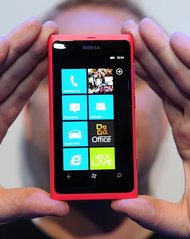 Paul Hackett/ReutersNokia’s Lumia 800 runs Windows Phone 7.
Paul Hackett/ReutersNokia’s Lumia 800 runs Windows Phone 7.
Microsoft’s Windows Phone 7 software has a unique, modern design that many say is superior to Android’s more rugged, computery look. But a former Microsoft employee says looks alone are not enough to make Windows Phone succeed.
Microsoft introduced Windows Phone 7 in November 2010, and has since formed a major partnership with Nokia in hopes of gaining a foothold in a mobile market that is increasingly dominated by Apple and Google. Despite the company’s best efforts, sales of Windows Phone 7 handsets are still tiny.
Charlie Kindel, an entrepreneur who recently left Microsoft’s Windows Phone team to start his own company, wrote a blog post Monday on why the software still hasn’t taken off. He breaks down what each party in the cellphone business wants — most notably, the carrier and the hardware maker.
The carrier wants to control the customer experience, and the manufacturer wants to own that and the hardware design as well. This is precisely why Windows Phone 7 faces hurdles, Mr. Kindel says.
To explain, Mr. Kindel analyzes Apple’s approach with the iPhone and Google’s approach with Android. With the iPhone, Apple controls the design of the software and additional transactions through the App Store, and it controls its own destiny with hardware because it makes the iPhone itself.
With Android, Google licenses the software to any manufacturer that wishes to use it, and allows the carriers to distribute Android software updates whenever they want. Many hardware makers and carriers are willing to play ball with Android, because it “bows down” to them.
With Windows Phone 7, Microsoft tells the carriers when they must issue software updates, and tells manufacturers how they must design the phones in order to run the operating system. This ensures a consistent experience among different devices.
And that is why Windows Phone faces so much difficulty gaining traction in the market, Mr. Kindel says. It creates friction among Microsoft, the carriers and the manufacturers.
“WP says ‘here’s the hardware spec you shalt use’ (to the device manufacturers). And it says ‘Here’s how it will be updated’ (to the carriers). Thus both of those sides of the market are reluctant,” Mr. Kindel writes.
That could explain why carriers do not immediately support every new Windows handset that hits the market. The brand-new Windows phone made by Nokia, the Lumia 710, for example, will initially be available on T-Mobile, while the bigger carriers ATT and Verizon have not announced plans to offer it.
Mr. Kindel’s post has stirred debate among technology pundits, like Robert Scoble, who criticized him for neglecting to highlight the importance of apps.
“I had dozens of people here for several events this weekend. Phones came up in nearly every conversation. Not a single person brought up Windows Phone 7,” Mr. Scoble wrote. “While watching TV I was reminded again of why: it’s all about apps.”
Mr. Scoble said that all people talk about today is what they can do with their phones using apps, and that businesses are constantly chattering about the apps they create to connect with customers. Therefore, apps act as a “lever” for the operating system maker to overpower the carrier, he argued.
Just where is Microsoft’s opportunity? Mark Winther, a telecommunications analyst at the research firm IDC, says Microsoft should focus on business customers.
“Social, cloud and mobile: It’s a marriage made in heaven that a lot of enterprises want,” Mr. Winther said in an interview. “So what is a huge enterprise environment today? It’s Microsoft, which is all over communications and collaboration tool sets.”
Mr. Winther explained that if Windows Phone 7 gracefully integrated with desktops and business software like Exchange and SharePoint, then it would gain a major advantage over iOS, the Apple mobile operating system.
He acknowledged that business customers are a smaller market than consumers, but said this niche still presents an opening for Windows Phone 7 to compete.
“Clearly the consumer individual is the gigantic market, and enterprise is small compared to that, but I think this is an opportunity,” Mr. Winther said.
Article source: http://feeds.nytimes.com/click.phdo?i=418afb1921a3468f39b544d2e0de97f0
Speak Your Mind
You must be logged in to post a comment.